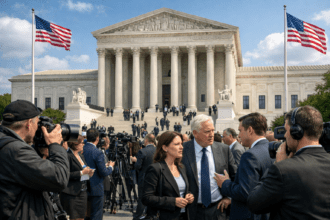Texas has officially taken a bold step into the world of digital assets by purchasing $5 million worth of BlackRock’s iShares Bitcoin Trust, known as iBIT. This move, executed through the Texas State Treasury Investment Pool, signals a dramatic shift in how U.S. states view Bitcoin not as a speculative gamble, but as a strategic, long-term asset. And while the dollar amount may seem small compared to the size of the Texas treasury, the symbolism is enormous. It marks the first time a major U.S. state has chosen to allocate taxpayer funds into a Bitcoin ETF, and that single decision could influence the financial behavior of states far beyond the southern border.
What makes this move even more fascinating is that Texas has been flirting with Bitcoin for years. From the rise of massive mining facilities to its increasingly crypto-friendly policies, the state has been quietly cultivating a relationship with digital assets. This purchase feels less like a random investment and more like the natural next step in a long-running storyline. Texas sees Bitcoin as a frontier technology something bold, disruptive, and a little rebellious, which fits perfectly with the state’s identity. And by choosing BlackRock’s iBIT fund, Texas is signaling that it wants exposure to Bitcoin in the safest, most regulated way possible.
BlackRock’s role in all of this can’t be ignored. Their iBIT product has rapidly become the darling of the institutional world, attracting pension funds, hedge funds, wealth managers, and now state treasuries. For government entities, Bitcoin ETFs like iBIT solve a lot of problems. They avoid the headaches of private key storage, regulatory gray areas, and complex custody rules. Instead, the state gets exposure to Bitcoin’s price movements through a product that feels familiar, safe, and fully compliant. For institutions that can’t touch physical Bitcoin, ETFs open the door and Texas just walked right through it.
But the real story here isn’t the purchase itself. It’s the ripple effects. Texas has a history of shaping national conversations, especially when it comes to energy, economics, and tech. Now imagine that same influence applied to digital assets. If Texas publicly supports Bitcoin, suddenly it becomes much easier for other states to consider doing the same. States like Wyoming, Colorado, Florida, and Tennessee have already been flirting with crypto legislation, but none have taken a public treasury position like this. Now the benchmark has been set, and the pressure is on.
Politically, this move is layered. Texas leaders have been vocal about their belief in financial freedom, decentralized technology, and property rights that extend into digital spaces. Buying Bitcoin isn’t just financial strategy it’s a statement about the future. It signals that Texas doesn’t want to wait for Washington to decide what’s acceptable or not. Instead, it’s carving its own path. In the same way Texas became a hub for oil, gas, tech, and manufacturing, it now aims to become the heart of America’s Bitcoin economy.
Economically, the $5 million figure may look tiny compared to TexPool’s massive multi-billion-dollar holdings, but the impact is symbolic. This purchase acts like a pilot test. If Bitcoin performs well, the state could easily scale its exposure. If prices continue rising in the long term, Texas will look like a visionary; if volatility hits, the ETF structure still keeps risk contained. Bitcoin has spent over a decade outperforming nearly every major asset class, so from a financial perspective, the long-term upside is hard to ignore.
And then there’s mining an area where Texas already leads. The state’s abundant energy, flexible grid, and pro-mining policies have attracted giant companies like Riot Platforms and Marathon Digital. A state-backed Bitcoin investment only strengthens the mining ecosystem. It reassures energy partners, gives miners confidence, and builds stability in a sector that has previously dealt with regulatory uncertainty. If you’re a Bitcoin miner looking for a permanent home, Texas just lit a giant neon sign that says “Welcome.”
Critics, of course, have concerns. Some say taxpayer money shouldn’t be exposed to Bitcoin’s volatility. Others argue that the environmental costs of mining conflict with sustainability goals. And some simply think Texas is politicizing an investment. Yet these critiques often overlook the bigger picture: Bitcoin has become a global asset class. Countries like Singapore, Switzerland, and the UAE have already embraced it. Major corporations hold it on their balance sheets. The U.S. risks falling behind if states don’t take the initiative.
That’s why this single purchase may represent far more than a line item in a treasury report. It might be the beginning of a new era in U.S. financial strategy. If Texas proves that Bitcoin exposure offers real long-term benefits, other states will almost certainly follow. And once enough states participate, the federal government may feel compelled to craft a national Bitcoin framework, similar to how state-level cannabis laws eventually pushed Washington to address legalization.
It’s not unrealistic to imagine a future where states maintain Bitcoin reserves for economic stability, universities hold Bitcoin endowments, and municipalities experiment with blockchain-based financial tools. Texas’ move opens that door, even if just slightly. For now, the Lone Star State is positioning itself as a pioneer one willing to take risks, challenge norms, and embrace emerging technology long before the rest of the country feels comfortable doing so.
When we zoom out, the message becomes clear: Texas isn’t just buying Bitcoin. It’s staking a claim in the financial future. Whether that future arrives in five years or twenty, Texas intends to be ahead of it, not behind. And if history has taught us anything, it’s that when Texas leads, others eventually follow. This $5 million step may be small on paper, but its impact could be monumental. We may look back at this moment as the spark that pushed Bitcoin further into the American mainstream






















